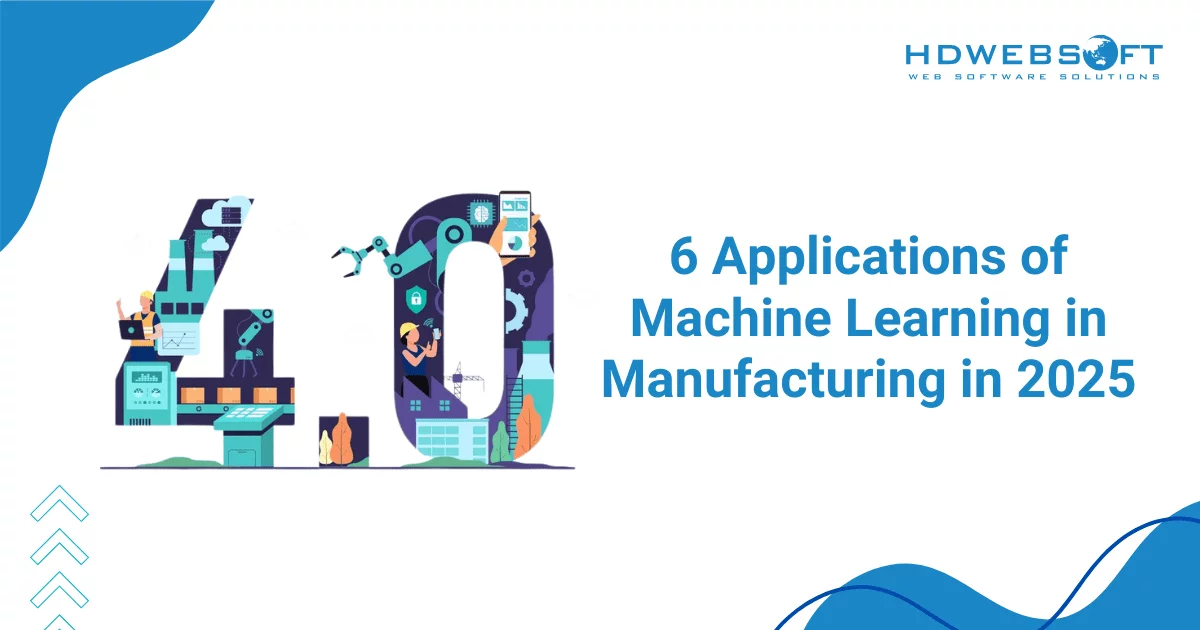
6 Applications of Machine Learning in Manufacturing
Machine learning in manufacturing is transforming how businesses operate in today’s fast-paced industrial landscape. Eventually, this adoption of advanced technologies becomes a necessity rather than an option. This cutting-edge innovation empowers manufacturers to improve production lines, predict maintenance needs, and remain competitive in an ever-evolving market. Additionally, it ensures that businesses stay future-ready while optimizing their operations.
But what makes ML so impactful in manufacturing, and how can your business benefit from it? Let’s explore.
What is Machine Learning in Manufacturing?

Machine learning is a branch of artificial intelligence that uses algorithms to analyze data and recognize patterns. It enables systems to make predictions or decisions without being explicitly programmed. When applied to manufacturing, ML leverages data from machines, sensors, and processes to enhance business operations.
Ideally, this innovative approach transforms how businesses operate, helping them reduce downtime, improve product quality, and make smarter, data-driven decisions. For example, machine learning in manufacturing can analyze sensor data from machines to predict maintenance needs before a breakdown occurs. Additionally, it ensures consistency in production by identifying potential defects in real time, ultimately minimizing waste and costs.
As industries embrace smart manufacturing, the role of ML in manufacturing continues to expand. Its ability to process massive amounts of data and deliver actionable insights allows manufacturers to adapt to market demands and stay competitive. In particular, 60% of leading automotive manufacturers in the US have implemented AI technologies in various capacities. This statistic has highlighted the growing adoption of this advanced technology within the manufacturing industry.
The Benefits of ML in Manufacturing
The manufacturing industry is rapidly evolving, and adopting advanced technologies has become a key to staying competitive. Among these innovations, ML in manufacturing stands out as a game-changer. Let’s dive into some of the major benefits it brings to the manufacturing world.
Enhanced Operational Efficiency
One of the most significant advantages of machine learning in manufacturing is its ability to streamline operations. Machine learning algorithms analyze large volumes of data in real-time. As a result, businesses can identify bottlenecks, optimize production processes, and enhance workflow efficiency.
Particularly, ML systems can predict the best times to adjust machinery settings or change production lines based on historical data. Consequently, manufacturers can reduce downtime and maximize resource utilization. This efficiency not only saves time but also translates into higher productivity.
Forecasting Maintenance Needs
Machine downtime is a costly issue for manufacturers, often resulting in delays and revenue loss. ML solves this problem through predictive maintenance, which uses data from sensors and machines to forecast when equipment might fail.
By predicting potential issues before they occur, businesses can schedule maintenance at the most convenient times. This approach reduces unplanned downtime, extends the lifespan of machinery, and cuts repair costs. In fact, studies show that predictive maintenance can increase uptime by 10-20%.

With machine learning in manufacturing, maintenance downtime is no longer a pain point for manufacturers.
Improved Quality Control
Ensuring consistent product quality is crucial in manufacturing, and machine learning in manufacturing excels in this area. ML-powered systems can analyze data from cameras, sensors, and other sources to identify defects in real-time. Resultantly, manufacturers can catch quality issues early in the production process, minimizing waste and ensuring customer satisfaction.
Additionally, ML systems can continuously learn from production data. From then on, they’ll improve their accuracy over time and adapt to changes in manufacturing conditions.
Optimized Supply Chain Management
ML is revolutionizing supply chain management by offering predictive insights that improve inventory control and intelligent logistics. It can analyze historical sales data and market trends to forecast demand accurately, ensuring that businesses maintain optimal stock levels.
Moreover, ML algorithms can help manufacturers identify the most efficient routes for shipping and anticipate potential delays. By optimizing these aspects of the supply chain, manufacturers can reduce costs, improve delivery times, and enhance customer satisfaction.
Energy Efficiency and Sustainability
Energy consumption is a major cost factor in manufacturing. Machine learning in manufacturing helps businesses monitor energy usage and identify inefficiencies. Ultimately, it leads to reduced consumption and cost savings.
For instance, ML algorithms can analyze production data to recommend the most energy-efficient times for operating machines. As sustainability becomes a priority across industries, ML in manufacturing is helping businesses reduce their carbon footprint while maintaining profitability.

Energy management and sustainability are the main issues for any business. Utilizing machine learning in manufacturing can address the problem effectively.
Faster Decision-Making
With the vast amount of data generated in manufacturing processes, making quick, informed decisions can be challenging. However, machine learning systems process data in real-time and provide actionable insights, which enables faster and more accurate decision-making.
On account of this, manufacturers can respond swiftly to market changes, production issues, or supply chain disruptions. Furthermore, by making data-driven decisions, businesses can remain agile and competitive in an ever-changing landscape.
Read more: The Insights to Machine Learning for Business Operations.
Enhanced Customization and Personalization
Consumer demand for personalized products is growing, and ML enables manufacturers to meet this demand efficiently. Machine learning in manufacturing systems can analyze customer preferences and behavior. Therefore, businesses can design and produce customized products while maintaining production efficiency.
In essence, this ability to offer tailored solutions enhances customer satisfaction and opens new revenue streams. With that in mind, the advanced technology offers manufacturers a significant competitive advantage.
6 Applications of Machine Learning in Manufacturing
The manufacturing industry is undergoing a technological revolution, with AI and ML in manufacturing driving much of this transformation. With its ability to analyze massive datasets and make predictions, ML is finding applications across every facet of manufacturing. Let’s explore six key applications of this groundbreaking technology.
Predictive Maintenance
One of the most impactful applications of machine learning in manufacturing is predictive maintenance. Traditional maintenance strategies often rely on fixed schedules or react to equipment failures. As expected, this approach can lead to unexpected downtime and high repair costs.
ML algorithms change this by analyzing data collected from sensors embedded in machinery using ML prediction models. Additionally, logistics analytics complements this process by optimizing the flow of materials and resources based on predictive insights. Together, they identify patterns that indicate wear and tear or potential failures.
Moreover, by predicting when a machine is likely to fail, manufacturers can schedule maintenance at optimal times, avoiding unexpected breakdowns. This not only minimizes downtime but also extends the lifespan of the equipment. Consequently, repair costs are minimized, it also makes sure of consistent production flow, which is critical in meeting market demands.
Quality Control
Maintaining high product quality is a top priority in manufacturing, and ML plays a crucial role in ensuring this. Traditional quality control methods often rely on manual inspection, which can be time-consuming and prone to human error. However, machine learning in manufacturing can analyze images, videos, and sensor data in real-time to detect defects with remarkable accuracy.
These systems not only catch defects during production but also provide insights into why they occur. For instance, they might identify inconsistencies in raw materials or deviations in machine settings that lead to quality issues. By addressing these root causes, manufacturers can consistently produce high-quality products, reducing waste and improving customer satisfaction.

Machine learning in manufacturing can analyze and give real-time data for accuracy than traditional quality control method.
Digital Twin Technology
Digital twin technology is another exciting application of machine learning for the manufacturing industry. A digital twin is a virtual replica of a physical asset, process, or system. With the digital twin of a production line or equipment, manufacturers can simulate various scenarios and predict outcomes.
For starters, this technology allows for better planning and optimization. To illustrate, manufacturers can test how changes to a production process might affect efficiency or how a machine might perform under different operating conditions.
In short, digital twins, powered by machine learning in manufacturing, provide invaluable insights that help manufacturers make data-driven decisions. Ultimately, it’ll reduce risks and improve overall efficiency.
Smart Manufacturing
Smart manufacturing, often referred to as Industry 4.0, integrates advanced technologies like machine learning, IoT, and robotics. The ultimate goal is to create a highly automated and interconnected production system. In this context, ML in manufacturing plays a central role in making smart manufacturing a reality. It helps factories become more agile by analyzing real-time data and adjusting operations dynamically.
For instance, ML can monitor production lines and automatically adjust machine settings to optimize output. If a bottleneck is detected, the system can reroute tasks to maintain productivity. This level of automation not only enhances operational efficiency but also allows manufacturers to respond quickly to changing market demands.

Machine learning in manufacturing is already in action, helping businesses with detection and automation.
Energy Management
Energy consumption is a significant cost for manufacturers, and managing it effectively is vital for both cost savings and sustainability. In this regard, machine learning in manufacturing helps businesses monitor and optimize energy usage across production facilities. Specifically, these smart systems analyze data from sensors to identify patterns and recommend adjustments, thereby reducing energy consumption.
For example, ML might suggest operating certain machines during off-peak hours when electricity rates are lower. Additionally, it can detect inefficiencies, such as energy waste due to malfunctioning equipment, and prompt immediate corrective actions. Accordingly, AI and ML not only cut costs but also support sustainability goals, making operations greener and more responsible.
Discover our Utility Software Development Services.
Smart Supply Chain Management
Efficient supply chain management is critical to the success of any manufacturing business. There is no wonder why ML is revolutionizing this aspect of the industry. Machine learning systems analyze historical and real-time data to forecast demand, manage inventory, and optimize logistics.
For instance, ML can predict how external factors like weather or market trends might impact supply chain operations. Similarly, retail AI leverages these predictive capabilities to optimize inventory management and enhance customer demand forecasting. In addition, machine learning in manufacturing can identify potential disruptions. Namely, delayed shipments and recommended alternative solutions to keep production running smoothly.
Signs that You Need to Adopt ML
If you’re wondering whether it’s time to integrate AI and ML into your business, some clear signs might indicate the need to make this shift. By recognizing these indicators early, you can stay ahead of challenges and embrace growth opportunities.
Frequent Equipment Downtime
If your equipment experiences frequent unplanned breakdowns, it may be time to leverage machine learning. Specifically, ML-powered predictive maintenance systems analyze data from sensors and machinery to predict failures before they happen.

Downtime is a massive problem for manufacturing as it harms profitability.
As a result, you can schedule repairs proactively, reducing downtime and extending the life of your equipment. Moreover, frequent disruptions in production can hurt your profitability, and adopting machine learning can help address this challenge effectively.
Inconsistent Product Quality
Maintaining consistent product quality is essential for customer satisfaction and brand reputation. If you notice fluctuations in the quality of your products, machine learning in manufacturing could be the solution.
In particular, ML algorithms can monitor production processes in real time, detect defects early, and suggest corrective actions. Resultantly, this not only ensures a high standard of quality but also minimizes waste, reducing costs in the long run.
Difficulty Managing Complex Data
Modern manufacturing processes generate massive amounts of data, from machine performance metrics to supply chain information. If you’re struggling to make sense of this data, ML can help by turning it into actionable insights.
With its ability to analyze large datasets quickly and accurately, ML helps you identify patterns, optimize workflows, and make data-driven decisions. Therefore, ignoring the potential of your data could mean missing out on valuable opportunities for improvement.
Check out our Data Scraper Services.
Inefficiencies in Energy Usage
High energy costs are a common pain point for manufacturers. When your operations are energy-intensive, it may be time to consider AI solutions.
In this context, machine learning in manufacturing can analyze energy consumption patterns, pinpoint inefficiencies, and recommend strategies to optimize usage. This not only saves money but also aligns with sustainability goals, helping your business reduce its carbon footprint.
Supply Chain Challenges
If you’re facing issues like inventory shortages, delivery delays, or difficulty forecasting demand, ML can provide much-needed clarity. By analyzing historical and real-time data, ML can optimize supply chain operations and improve logistics. Hence, adopting AI for manufacturing ensures that your supply chain remains agile and resilient, even in uncertain market conditions.
HDWEBSOFT as Reliable Partner for Implementing AI&ML for Your Business
Machine learning in manufacturing is not just a trend—it’s a game-changer that drives efficiency, reduces costs, and enhances product quality. Whether you’re looking to improve predictive maintenance or streamline your supply chain, ML applications can transform your operations.
Implementing machine learning in manufacturing requires expertise, and that’s where HDWEBSOFT comes in. With years of experience in AI and ML development services, we specialize in creating tailored solutions for businesses in general.
With a promise of quality, our team will ensure a smooth integration of machine learning into your existing workflows. Partner with us to unlock the full potential of ML and stay ahead in the competitive manufacturing industry.









